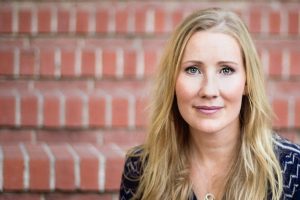I made mistakes early in my career, but after 16 years I've pinpointed 3 clear signs you've found a great financial advisor

- When I started out as a financial planner at 23, I talked too much — I was too eager to prove I knew my stuff.
- After 16 years in the business, I now know what makes a great planner.
- A great planner talks about their clients on their website, talks just 25% of the time in meetings, and is someone you can trust.
- Set up a no-obligation virtual consultation with a fiduciary Financial Advisor to see how you can grow your portfolio »
When I was a brand new financial planner 16 years ago (at 23, looking about 14), I really wanted to prove to clients that I knew my stuff, so I talked waaaaaay too much. (Apologies, early clients.) I took the responsibility of being a financial planner really seriously, and I was desperate to learn so that I could give good advice. But I was also insecure about my age and my life stage. I was renting an apartment with roommates from college, driving a Honda Civic with a side mirror glued on with epoxy, struggling to fund a Roth IRA, and serving clients twice my age with kids and mortgages and million-dollar portfolios.
The distance between us felt so big, so I tried hard to be a Doogie Howser type and prayed I wouldn’t run into clients on the weekends in my sweats eating at the local Mexican chain with my boyfriend. My awareness of the distance between where I was and where my clients were prevented me from being truly, fully present because I was always trying to prove myself — my knowledge, my maturity, and my self-worth.
My evolution as a financial planner
After I got a few years under my belt and became a certified financial planner, my knowledge and confidence grew, but I still misunderstood my role as a financial planner. I thought my role was to lead clients down the path that I knew was best for them — to solve their puzzle my way — based on all the things I’d learned, all the research I’d done, and all the clients I’d served. I talked less, but I still didn’t listen as well as I could have. I was too focused on explaining why my advice was the right way to go. My intentions were good, and my advice was sound, but I was still mistaken about what my role truly was.
Over the last several years, I’ve come to see things differently. I now understand that my role isn’t to tell clients what to do. It’s to be a thought partner for clients, helping them discover what they want to accomplish, putting their goals in context so they can prioritize what’s important to them, and providing a few optimized paths to get where they want to go. It’s their path, not mine — I’m there to help them make wise decisions, optimize progress, avoid pitfalls along the way, and see their path more clearly, not tell them what to do.
Now that I deeply understand my role, my advice looks different for every client because their lives and goals and priorities are different. So if you’re looking for a financial planner who’s more of a thought partner than someone who just tells you what to do, here’s what I recommend.
How to find the best financial planner for you
1. Read their website
First, check out their website. Are they going on and on about themselves and their process, or are they focused on your experience as a client and the benefits of their services for you? Are they thinking and communicating from their perspective or yours?
2. Pay attention to how much they talk
Next, when you’re interviewing advisors, pay attention to how much they talk versus how much they listen in your initial meeting. A good advisor will talk 25% or less of the time and be focused on understanding your situation, your goals, your challenges, and your questions. Pay attention to the questions they’re asking — are they focused on account balances and how much you make, or what’s important to you and what you’re concerned about?
3. Trust yourself
Finally, trust your gut. The right financial planner should feel like an expert, but should also feel like someone you can talk to — someone you want to talk to. Clients share everything from miscarriages to marital tension to day-to-day parenting struggles with me. Your financial planner doesn’t need to be your best friend, but it is important to find someone you truly connect with.
And if you happen to be a young financial planner, I hope you can take my experience and learn this lesson much more quickly than I did! Talk less, listen more. Focus on what’s actually important to your client rather than what you think should be important to them. Don’t worry so much about how smart you sound. Spend your time focused on understanding what your clients want to accomplish and helping them get there. Because it’s not about you, it’s about them.
Disclosure: This post is brought to you by the Personal Finance Insider team. We occasionally highlight financial products and services that can help you make smarter decisions with your money. We do not give investment advice or encourage you to adopt a certain investment strategy. What you decide to do with your money is up to you. If you take action based on one of our recommendations, we get a small share of the revenue from our commerce partners. This does not influence whether we feature a financial product or service. We operate independently from our advertising sales team.
Source: Read Full Article
